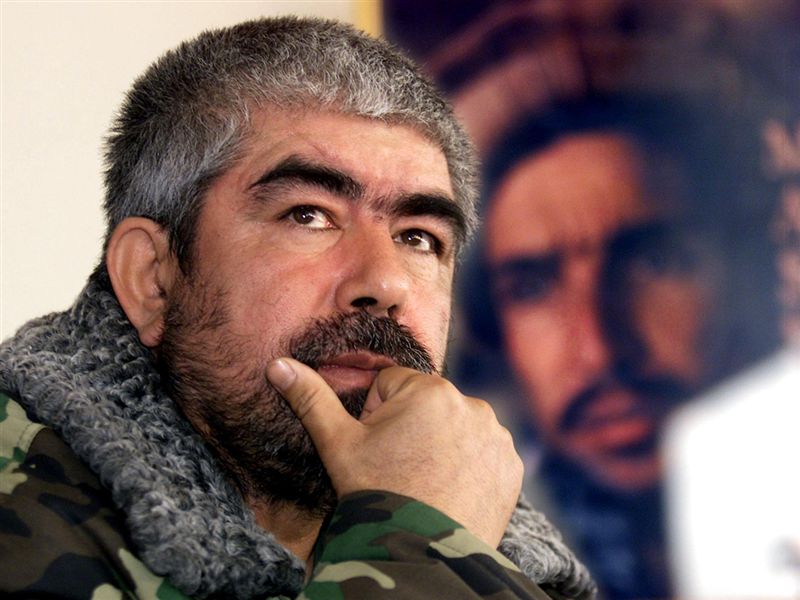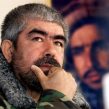
The Return of the Kingmaker: Afghanistan’s General Dostum Ends his Exile
Publication: Terrorism Monitor Volume: 7 Issue: 26
By:

After seven months in exile in Turkey, General Rashid Dostum, the paramount leader of Afghanistan’s Uzbek and Turkmen communities, was given permission by the Karzai government to return to the country. Thousands of his supporters, including many beating drums and chanting “Long live General Dostum!” mobbed him when he landed in Kabul International Airport on the evening of August 16. Rallies were also held in the north, his traditional bailiwick, where Uzbeks predominate. This was the end of Dostum’s third exile in Turkey (the previous two being caused by the Taliban in 1997 and 1998 respectively) and cements his status as Afghanistan’s most resilient warlord.
Dostum was also reappointed by President Karzai to the symbolic post of Chief of Staff of the Afghan Army. His exile ended with the Afghan government’s announcement that, "General Abdul Rashid Dostum can travel abroad and can return home as an Afghan citizen and on the basis of the constitution. He has total freedom in this regard" (Reuters, August 16).
Dostum had traveled to Turkey on December 4, 2008 to visit his family for the Kurban Bayram (Eid al Adha) festival, but was then denied the right to return by the Afghan government. The Turkish press reported that Dostum had in fact been told to leave Afghanistan by President Karzai (a claim he adamantly rejected). This was seen as a way to punish Dostum, who has previously served as Chief of Staff of the Afghan Army and Deputy Defense Minister, for various acts. The most notable of these was his well publicized physical beating of Akbar Bai, a Turkmen politician and former aide that Dostum believed had betrayed him (see Terrorism Monitor, April 17, 2008).
But Dostum’s greatest crime in the eyes of the Karzai government seems to have been his role as a grassroots leader among the Uzbeks and related Turkmen of northern Afghanistan. Dostum’s Jumbesh Party is among the most organized in all of Afghanistan and often acts in defense of Uzbek rights vis a vis the central government. When President Karzai tried to install an unpopular Pashtun governor in the Uzbek-dominated Faryab Province in 2006, for example, Dostum’s Jumbesh followers chased him out. Such acts have been defined by the Karzai government as a challenge to its authority.
Karzai’s Ensures his Election
Dostum’s return—which once seemed improbable due to pressure from US Secretary of State Hillary Clinton to keep him in exile following the publication of a critical article on him in the New York Times—was part of a backroom deal with President Karzai. [1] Karzai, indicated by polls as having support from roughly 45% of Afghans, needs to win 50% of the vote in the August 20 contest to avoid a run-off election. Karzai’s main opponent, Tajik leader Abdullah Abdullah, is predicted to garner 25% of the vote, but this percentage may increase since Pashtun turnout for the elections in the south is predicted to be lower than in 2004 due to Taliban threats and intimidation. As an ethnic Pashtun, Karzai needs to gain the support of non-Pashtuns from the north to seal his victory over his Tajik opponent, Abdullah. Hence his decision to allow Dostum to return.
Dealing with the Warlords
Karzai has already received endorsements from other key regional leaders who are often simplistically known as jang salaran (warlords) by their detractors. These include Ismail Khan, a popular Tajik from the western city of Herat who has been given the post of Minister of Water and Electricity, Gul Agha Sherzai, a notorious Pashtun mujahideen leader from Kandahar who currently serves as governor of Nangahar Province, Karim Khalili, a Hazara leader who has served as Karzai’s Vice President, Abdul Rasul Sayyaf, a Pashtun who represents members of his group in the north, Fahim Khan, a Tajik commander of the Northern Alliance who is running as Karzai’s Vice President, and Sher Muhammad Akhunzada, a Pashtun governor of Helmand Province who was removed from his post for involvement in opium smuggling. All of these leaders have brought their ethnic or tribal vote with them for Karzai in return for his support for them in the government.
Such deals have given Karzai’s critics ammunition for accusing him of catering to warlords at the expense of democracy. Human rights groups in the West have deplored this “umbrella’” approach and the U.S. government has also expressed its concerns. When it received news of Dostum’s return, the U.S. embassy expressed its dismay, stating it had “made clear to the government of Afghanistan our serious concerns about the prospective role of Mr. Dostum in today’s Afghanistan, particularly during these historic elections. The issues surrounding him become all the more acute with his return to Afghanistan during this period. Among other concerns, his reputed past actions raise questions of his culpability for massive human rights violations" (AP, August 17).
Glib calls for Karzai to cut his ties with leaders like Dostum, however, overlooks one key point to understanding Afghanistan. All politics are local. While foreigners may define men like Dostum as warlords, among their own qawm (tribe, ethnic group or regional community) they are seen as respected leaders. Among the Uzbeks and related Turkmen, for example, Dostum is known as either Baba (Father) or Pasha (Commander). He is seen as a grass roots representative of their people vis a vis Kabul. [2] Any perceived offense to their local leader by the central government can cost it the support of that community. If Dostum was prohibited to return, he promised that his followers would vote for Abdullah Abdullah. This would cost Karzai roughly ten percent of the Afghan vote based upon Dostum’s performance as a candidate in the 2004 presidential elections, when he gathered that percentage of support.
Dostum’s Rise to Political Prominence
Karzai’s alliance with Dostum is made easier by the fact that in many ways he defies facile stereotypes of warlords. Unlike many other warlords in Afghanistan, Dostum was not a fundamentalist mujahid. On the contrary, he first rose to power in the Soviet-backed Communist government of the early 1980s as an anti-mujahideen counterinsurgent. When the anti-Communist jihad ended in 1992, Dostum carved out an autonomous mini-state in the north made up of six Uzbek-dominated provinces based on Mazar-e-Sharif. Dostum’s secular realm was overwhelmed by the Taliban in 1998, and he was forced to flee to exile in Turkey.
Dostum returned in April 2001 to fight a horse-mounted insurgent war against the Taliban from a mountain base in the Hindu Kush. When he heard about the September 11, 2001, terrorist attacks, Dostum offered to assist the Americans. On Nov. 9, 2001, he seized the holy city of Mazar-e-Sharif, and this led to the collapse of the Taliban house of cards, thus preventing the United States from having to launch an invasion of the Afghan "graveyard of empires" in winter. Since then Dostum has had an on and off again relationship with Karzai as he has tried to maintain a modicum of autonomy for his people in regards to the central government. But as the Taliban began to infiltrate the north, Dostum was exiled in December 2008.
Afghanistan’s ethnic-Uzbeks, who make up 10 percent of the population, threatened they would not vote for President Karzai in the August 20 election if Dostum were unable to return. Most interestingly, the Taliban have made their opposition to Dostum’s return clear. In a recent video of captured U.S. soldier Pfc. Bowe R. Bergdahl, the Taliban claimed Dostum and other warlords were guilty of looting, organized crime, mass murders and crimes against humanity (Media Commission of the Islamic Emirate of Afghanistan, July 14). The Taliban have also cynically offered to stop fighting in Helmand Province in the south if Dostum is tried by the Karzai government (International Security Assistance Force, Afghan Mass Media Summary. July 20).
Fearing the loss of the Uzbek vote and a re-infiltration of the Taliban into Dostum’s northern lands, Karzai finally agreed to let him return. Since his return, Dostum has begun campaigning for Karzai and ended a split in his Uzbek-dominated Jumbesh Party caused by his departure. His Uzbek and Turkmen followers have promised to vote for Karzai in return for the respect given to the Pasha, Dostum.
Conclusion
Seen in this light, Dostum, the new Chief of Staff of the Afghan Army, appears poised to give Karzai a victory among his Uzbek ethnic constituency in return for an end to his exile and seat in the government. Dostum’s own power in the plains of the north and Karzai’s power as president thus appears assured by the quid pro quo.
While many see this sort of Machiavellian politicking as essentially making a deal with the devil, it actually follows Afghan tradition, where the central government has often had little power in the provinces. Traditionally the Afghan president or king made deals with local khans who had real grassroots power, rather than ruling directly. For Karzai, who has been called the “Mayor of Kabul,” this is perhaps the best way to keep himself in power, regardless of the public relations fallout his decisions might have among vocal critics in the West who do not have the same grasp of Afghan tribal politics.
Notes:
1. The New York Times article alleges the killing of "perhaps thousands" of Taliban prisoners of war in November 2001, an event denied by General Dostum. It described this purported incident as "the most significant mass killing in Afghanistan after the 2001 American-led invasion." See James Risen "U.S. Inaction Seen After Taliban P.O.W.’s Died." New York Times, July 10. See also The News [Islamabad], July 16; Jang [Rawalpindi], March 27, 2003.
2. For more on Dostum’s role as popular community leader in the plains of Afghan Turkistan see: Brian Glyn Williams. "Writing the Dostum Name. Field Research with an Uzbek Warlord in Afghan Turkistan" Central Eurasian Studies Review, Volume 6, no. 1/2. Fall 2007, p.3.





